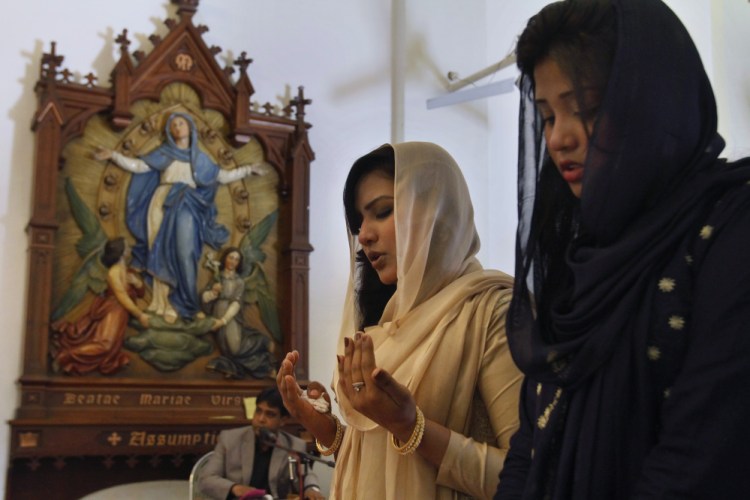What do Jesus Christ, Muhammad, Siddhartha Gautama and Moses all have in common? Besides being religious figures, they are all men. Yet looking around the world, the majority of their followers are women.
Globally, more women than men identify with a religion, pray daily and say that religion is “very important” to them, according to data from the Pew Research Center. Around the world, 83.4 percent of women say they identify with a religion, compared with 79.9 percent of men, Pew says, meaning there are about 100 million more religiously affiliated women on the planet than men. But why?
This is an old question, one that experts have dubbed a “scientific puzzle.” Some researchers have argued that the difference is because of biology, some say that it’s a product of social and cultural factors, and some maintain that it’s both. But Pew’s data suggests that, at the very least, biology isn’t the only factor. Men and women’s religious behaviors and beliefs vary significantly by religious group and country, suggesting that the way men and women are raised and socialized does play a role.
The Pew study surveys six religious groups – Christians, Muslims, Buddhists, Hindus, Jews and the religiously unaffiliated – across 192 countries. It finds that, globally, women are more religious than men, while men make up 55 percent of the world’s religiously unaffiliated people.
This religious gender gap is even more pronounced in the United States, which is much more religious in general than other advanced economies. According to Pew, 64 percent of American women but only 47 percent of American men say they pray daily – compared with 30 percent of women and 28 percent of men in Canada and 15 percent of women and 9 percent of men in France. In the United States, 68 percent of atheists are men.
In the past, some researchers have argued that biology plays the most important role in this religious gender gap. One theory has been that higher levels of testosterone in men, which leads to more risk-taking behavior, also lead to a greater willingness to gamble on missing out on the afterlife. Other researchers have argued for biological explanations after observing that women with more “feminine” traits – like being affectionate, sympathetic, compassionate, tender and loving to children – are more likely to be religious.
But others insist that nurture – the way women and men are taught to behave and the values that they are taught to hold – is a more important influence on the religious differences between men and women than nature is.
Pew’s data may support this theory in two ways. First, it observes some big differences in the religious gender gap across different cultures – trends that suggest that men and women’s religious differences stem not just from biology but from culture.
Among Christians, women are more likely than men to attend services, pray daily, say religion is important, and believe in heaven, hell and angels. But among Muslims, the gender gaps are less consistent. Muslim men are a lot more likely to attend weekly religious services because of religious guidelines that encourage men to pray at mosques but allow women to pray at home. And while Muslim women are more likely than men to pray and believe in angels, other behaviors and beliefs are relatively the same between Muslim men and women.
Secondly, Pew finds that women’s religiosity varies somewhat depending on whether they work or stay home – a sign that religious beliefs might be affected by the environment men and women are exposed to. Women who work outside the home hold beliefs that are more similar to those of men, reporting lower levels of religious commitment than women who are not in the labor force, according to the survey. Or the causality could be the other way around – religious women could be more likely to stay home because of a belief in more traditional gender roles.
In addition, Pew finds that Christian countries in which more women work tend to have smaller religious gender gaps between men and women, though the trend doesn’t hold for other religious groups.
Researchers have floated numerous theories for how culture and social norms might create a religious gender gap. Some argue that, for women who didn’t traditionally work outside the home, the church offered the kind of social and psychological benefits that jobs offered to men, such as a personal identity and a social community.
Not having a job could also mean that women had more time for religious activities, or that women had less exposure than men did to the secularizing forces that have gradually come to predominate in public life.
Other theories include that women have been particularly pressured to be religious as a way to control their sexuality or that the Christian church has been less supportive of the identities of working women than of homemakers.
Send questions/comments to the editors.


